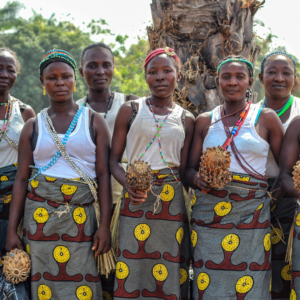WorldFish, through the Asia-Africa BlueTech Superhighway (AABS) project, is investigating how aquaculture, particularly Integrated Multi-Trophic Aquaculture (IMTA), can create sustainable livelihoods for women and youth in Kenya’s coastal counties of Kilifi, Kwale, and Mombasa. Despite living near abundant marine resources, women and young people often face exclusion from stable employment, while traditional sectors such as fishing, farming, and tourism are increasingly strained by overfishing, climate change, limited capital access, and insecurity. IMTA is gaining recognition as a sustainable and economically promising alternative.
Research shows that gender roles strongly influence participation in aquaculture. Young men are generally involved in pond construction, fish feeding, and harvesting, while women are largely confined to post-harvest tasks such as cleaning, drying, and selling. Seaweed farming is viewed as “women’s work,” and older women face additional barriers, including restricted mobility, household responsibilities, and social norms that limit autonomy in livelihood choices. Young people, especially women, often lack access to land, productive assets, and decision-making power, yet they demonstrate strong aspirations to build businesses, contribute to household food security, and gain financial independence.
Early findings indicate that IMTA’s potential is constrained by multiple barriers. At the individual level, limited awareness and technical knowledge reduce interest in aquaculture. Household constraints, social stigma, and structural issues—including degraded ecosystems, licensing bureaucracy, weak extension services, market instability, and inadequate financing—further hinder participation. Women, in particular, may internalize the belief that aquaculture is a male-dominated sector, while poor water quality and unpredictable weather increase risk for all participants.
To promote inclusive engagement, strategies focus on gender- and youth-responsive training, flexible hands-on learning opportunities, skills development in marketing and entrepreneurship, and access to finance and infrastructure such as seed grants, youth-friendly loans, subsidized inputs, cold storage, and transport. Facilitating market linkages and value addition for aquaculture products can enhance incomes and visibility. Challenging restrictive gender norms through community dialogues, intergenerational engagement, and leadership involvement, alongside integrating gender and youth targets in county-level blue economy policies, is critical to ensuring equitable participation and decision-making.
Aquaculture, especially IMTA, holds the potential to drive job creation, resilience, and environmental stewardship in Kenya’s coastal regions. Realizing this potential requires addressing structural, social, and economic barriers, listening to the aspirations of women and youth, and ensuring they have access to resources and opportunities. By doing so, aquaculture systems can become inclusive, sustainable, and equitable, fostering both livelihoods and environmental sustainability.






